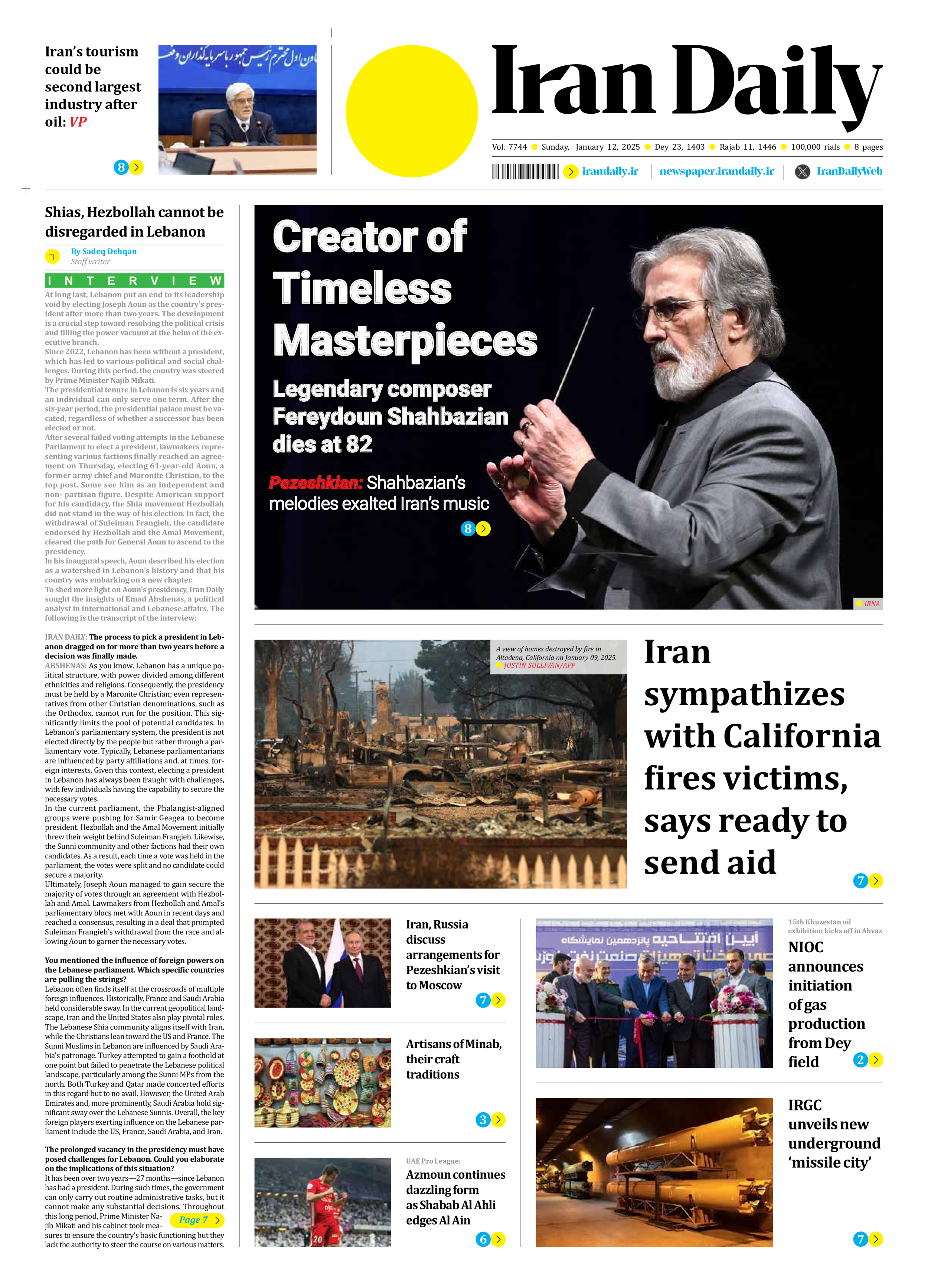
Shias, Hezbollah cannot be disregarded in Lebanon
By Sadeq Dehqan
Staff writer
At long last, Lebanon put an end to its leadership void by electing Joseph Aoun as the country’s president after more than two years. The development is a crucial step toward resolving the political crisis and filling the power vacuum at the helm of the executive branch.
Since 2022, Lebanon has been without a president, which has led to various political and social challenges. During this period, the country was steered by Prime Minister Najib Mikati.
The presidential tenure in Lebanon is six years and an individual can only serve one term. After the six-year period, the presidential palace must be vacated, regardless of whether a successor has been elected or not.
After several failed voting attempts in the Lebanese Parliament to elect a president, lawmakers representing various factions finally reached an agreement on Thursday, electing 61-year-old Aoun, a former army chief and Maronite Christian, to the top post. Some see him as an independent and non- partisan figure. Despite American support for his candidacy, the Shia movement Hezbollah did not stand in the way of his election. In fact, the withdrawal of Suleiman Frangieh, the candidate endorsed by Hezbollah and the Amal Movement, cleared the path for General Aoun to ascend to the presidency.
In his inaugural speech, Aoun described his election as a watershed in Lebanon’s history and that his country was embarking on a new chapter.
To shed more light on Aoun’s presidency, Iran Daily sought the insights of Emad Abshenas, a political analyst in international and Lebanese affairs. The following is the transcript of the interview:
Iran Daily: The process to pick a president in Lebanon dragged on for more than two years before a decision was finally made.
Abshenas: As you know, Lebanon has a unique political structure, with power divided among different ethnicities and religions. Consequently, the presidency must be held by a Maronite Christian; even representatives from other Christian denominations, such as the Orthodox, cannot run for the position. This significantly limits the pool of potential candidates. In Lebanon’s parliamentary system, the president is not elected directly by the people but rather through a parliamentary vote. Typically, Lebanese parliamentarians are influenced by party affiliations and, at times, foreign interests. Given this context, electing a president in Lebanon has always been fraught with challenges, with few individuals having the capability to secure the necessary votes.
In the current parliament, the Phalangist-aligned groups were pushing for Samir Geagea to become president. Hezbollah and the Amal Movement initially threw their weight behind Suleiman Frangieh. Likewise, the Sunni community and other factions had their own candidates. As a result, each time a vote was held in the parliament, the votes were split and no candidate could secure a majority.
Ultimately, Joseph Aoun managed to gain secure the majority of votes through an agreement with Hezbollah and Amal. Lawmakers from Hezbollah and Amal’s parliamentary blocs met with Aoun in recent days and reached a consensus, resulting in a deal that prompted Suleiman Frangieh’s withdrawal from the race and allowing Aoun to garner the necessary votes.
You mentioned the influence of foreign powers on the Lebanese parliament. Which specific countries are pulling the strings?
Lebanon often finds itself at the crossroads of multiple foreign influences. Historically, France and Saudi Arabia held considerable sway. In the current geopolitical landscape, Iran and the United States also play pivotal roles. The Lebanese Shia community aligns itself with Iran, while the Christians lean toward the US and France. The Sunni Muslims in Lebanon are influenced by Saudi Arabia’s patronage. Turkey attempted to gain a foothold at one point but failed to penetrate the Lebanese political landscape, particularly among the Sunni MPs from the north. Both Turkey and Qatar made concerted efforts in this regard but to no avail. However, the United Arab Emirates and, more prominently, Saudi Arabia hold significant sway over the Lebanese Sunnis. Overall, the key foreign players exerting influence on the Lebanese parliament include the US, France, Saudi Arabia, and Iran.
The prolonged vacancy in the presidency must have posed challenges for Lebanon. Could you elaborate on the implications of this situation?
It has been over two years—27 months—since Lebanon has had a president. During such times, the government can only carry out routine administrative tasks, but it cannot make any substantial decisions. Throughout this long period, Prime Minister Najib Mikati and his cabinet took measures to ensure the country’s basic functioning but they lack the authority to steer the course on various matters.
Page 7







